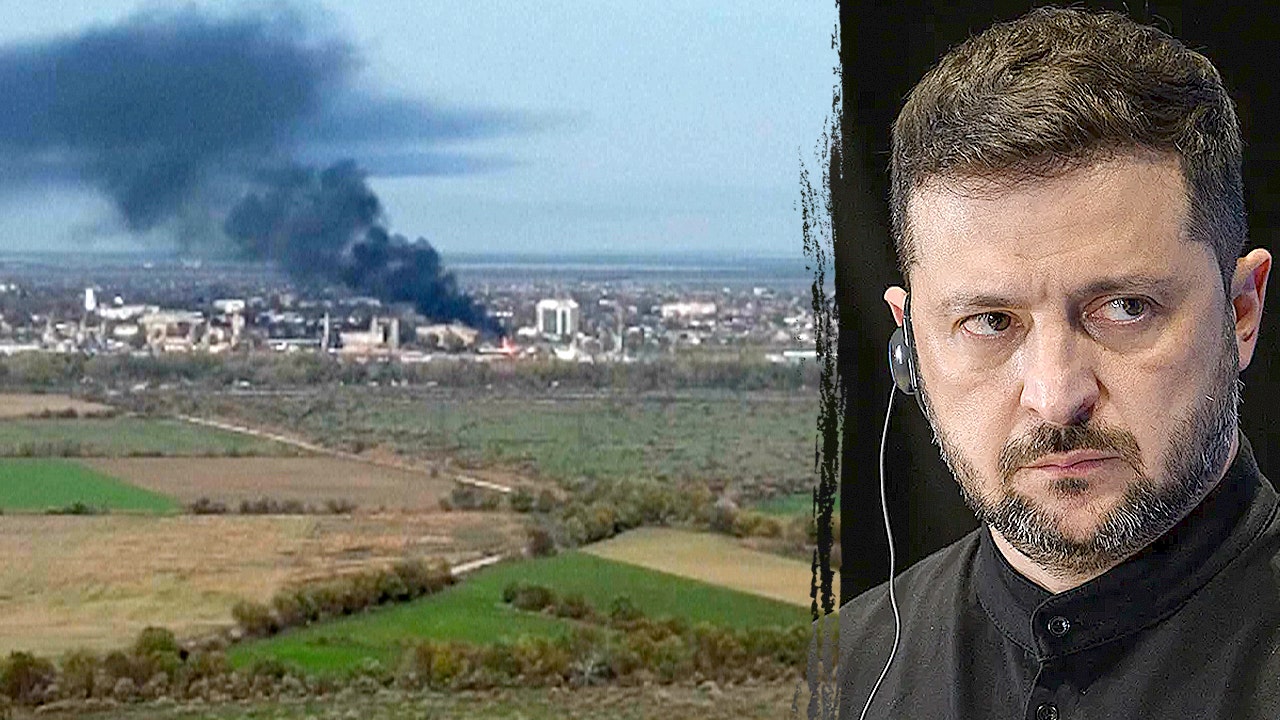A chilling new chapter in the Ukraine conflict unfolded on Monday, as a suspected Russian drone attack ignited a Turkish tanker in the Odesa region. The inferno, blazing fiercely on the waters of the Danube River, sent shockwaves through the region, forcing immediate evacuations across the border in Romania and casting a dangerous shadow over the periphery of NATO and European Union territory. This isn’t just an incident; it’s a stark, fiery reminder of a war relentlessly creeping closer to Europe’s doorstep.
The Blaze on the Danube: A New Frontline
The attack, which saw a vessel laden with gas engulfed in flames, occurred in a Ukrainian port along the Danube, a critical waterway for international trade. Eyewitness accounts and initial reports painted a grim picture: a Turkish-flagged tanker, caught unawares, became a fiery spectacle, its hull illuminated against the night sky as emergency services scrambled to contain the disaster. The intensity of the blaze was such that it posed an immediate environmental and safety hazard, leading to concerns about potential explosions and widespread pollution.
This isn’t an isolated event, but it is one that possesses a terrifying proximity. The Danube River here forms a natural frontier with Romania, a steadfast member of both NATO and the EU. The very air across the river, just meters from sovereign European territory, was thick with the smoke and stench of burning fuel, underscoring the thin line between conflict and peace in this volatile region.
“This isn’t merely an attack on a vessel; it’s an assault on the principle of free navigation and a dangerous provocation at the very doorstep of the European Union and NATO,” a senior Romanian official was quoted as stating, encapsulating the profound alarm felt across the border. “The implications for regional stability are undeniable and deeply concerning.”
Evacuations and Fear Across the River
The immediate and most direct consequence on NATO territory manifested in the swift, mandatory evacuation of a Romanian village situated directly on the border with Ukraine. Residents, startled by the drone strikes and the ensuing inferno, were told to leave their homes, a stark and unsettling intrusion of war into their daily lives. For many, it was a moment of terrifying realization: the conflict that had often felt distant, confined to news headlines, was now literally burning in their backyard.
- Village Evacuations: Communities closest to the affected Ukrainian port, such as those in the vicinity of Isaccea, were swiftly moved to safety, disrupting thousands of lives overnight.
- Air Quality Concerns: The burning tanker released plumes of acrid smoke, raising serious health and environmental alarms for residents on both sides of the Danube, prompting warnings and monitoring by environmental agencies.
- Disruption to River Traffic: Shipping along the crucial Danube artery faced immediate suspension and significant delays, impacting vital trade routes for grain, fuel, and other commodities moving in and out of Eastern Europe.
- Increased Security Alerts: Romanian authorities elevated security protocols along the border, deploying additional personnel and resources to monitor the situation and respond to any further escalations or spillover effects.
Geopolitical Firestorm: NATO’s Red Line?
The Danube River serves as more than just a geographical boundary; it is a vital economic artery and, in this context, a geopolitical fault line. Russia’s consistent targeting of Ukrainian port infrastructure along this river and the Black Sea has been a cornerstone of its strategy to cripple Ukraine’s economy. However, striking a vessel so close to NATO territory, and specifically a Turkish-flagged one, elevates the incident to a new, perilous level of escalation.
While Russia has frequently attacked Ukrainian port facilities since the collapse of the Black Sea grain deal, the direct impact and proximity to a NATO member’s border are not easily dismissed as collateral damage. The incident forces a critical question: Was this a reckless act of war spilling over, or a calculated test of resolve against the backdrop of an already strained international security environment?
Escalation Dynamics
This incident lands amid a broader context where Ukrainian President Zelenskyy has been working to secure alternative supply routes and deals, including a reported US gas deal mentioned in earlier news. Disrupting maritime and riverine transport of energy resources could be a deliberate Russian attempt to undermine Ukraine’s economic resilience and its capacity to engage in such agreements. It’s a strategy aimed at choking off vital lifelines.
Moreover, the involvement of a Turkish tanker introduces another layer of complexity. Turkey, a key NATO member, has maintained a delicate balancing act between Kyiv and Moscow throughout the conflict. An attack on its commercial shipping could test the limits of its diplomatic flexibility and potentially provoke a stronger reaction from Ankara, impacting the already fragile dynamics in the Black Sea region.
- Will NATO invoke Article 4 consultations? The direct impact on Romanian territory and the threat to a NATO member’s vessel could trigger discussions among allies regarding collective defense and security measures.
- What measures will be taken to secure Danube navigation? International pressure will likely mount for enhanced protection of vessels transiting the Danube, possibly involving increased naval presence or air defense capabilities.
- How will this impact global energy markets? Attacks on gas tankers and critical energy infrastructure can create volatility and uncertainty in an already sensitive global energy landscape, potentially driving up prices.
- Is this a deliberate act of intimidation by Moscow? Many analysts will dissect the timing and location to determine if this was a message intended for NATO, the EU, or Ukraine’s international partners.
Economic Repercussions and Energy Vulnerability
The Ukrainian Danube ports have become increasingly vital for Kyiv’s export capabilities, especially after Russia withdrew from the UN-backed grain deal, effectively blockading Ukraine’s Black Sea ports. These riverine routes offer a lifeline for grain, metals, and increasingly, energy products like gas. An attack on a gas tanker underscores Russia’s intent to disrupt any and all avenues of Ukrainian commerce, severely impacting its wartime economy.
Such incidents dramatically increase the cost of shipping due to heightened insurance premiums and the inherent dangers. Shipping companies are forced to weigh the immense risks against the potential profits, often leading to a reduction in services or a significant increase in prices for end consumers. This ripple effect destabilizes not just Ukraine’s economy, but also contributes to global inflation and supply chain disruptions.
A Broader Strategy?
This targeting of a gas tanker aligns with Russia’s broader strategy of weaponizing energy and economic pressure. By disrupting Ukraine’s ability to export and import vital goods, Moscow aims to deplete Kyiv’s financial resources, undermine its capacity to fund its defense, and create further humanitarian and economic crises that strain international support. The mention of Zelenskyy’s US gas deal in broader context suggests a direct Russian intent to thwart Ukraine’s efforts to secure alternative energy independence and robust energy supply chains, particularly those involving Western partners.
International Response and the Path Forward
The international community will undoubtedly condemn this latest act of aggression. Calls for increased air defense capabilities for Ukraine and more robust protection for civilian shipping in the Danube and Black Sea will intensify. However, the delicate balancing act of providing support without triggering a direct conflict between NATO and Russia remains paramount. Diplomatic channels will be strained, and the search for effective deterrence measures will be urgent.
“The Danube attack highlights the ever-present danger of miscalculation and the urgent need for robust de-escalation mechanisms, even as support for Ukraine intensifies,” observed Dr. Elena Petrova, a prominent expert in international security. “The global community must navigate this perilous terrain with both firmness and prudence, ensuring accountability without inadvertently widening the conflict.”
As the smoke clears from the Danube, the incident serves as a stark reminder of the volatile nature of the conflict and its capacity to spill beyond conventional battlegrounds. Protecting vital infrastructure and civilian lives, while upholding the principles of international law and freedom of navigation, remains the enduring, complex challenge for Ukraine and its allies in a war waged on the very edge of Europe.


